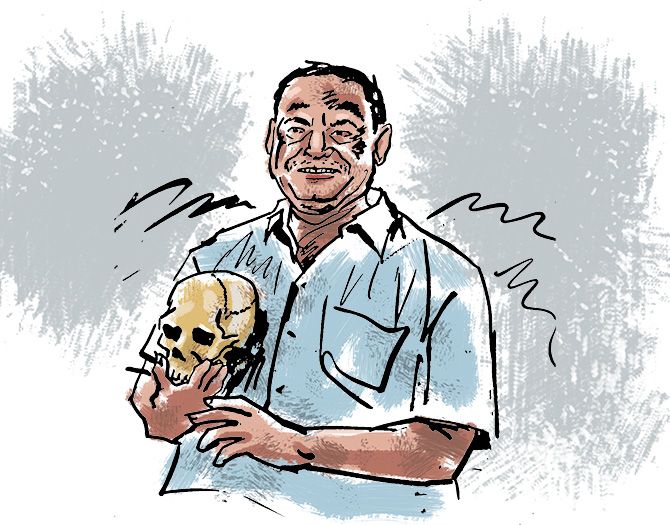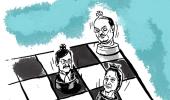'What delighted Christopher 'Doglis' Marquis, a Bandra dog-breeder who was a panch or witness in the case, most was spotting his own face among the police pictures of the exhumation process. As well as the video.'
'Each time he saw himself he would exclaim, child-like: “See my photo is here!” much to the amusement of the judge and the court.
'Judge Jagdale commented, chuckling: “He is so engrossed in his own photographs. Oblivious'.'
Vaihayasi Pande Daniel reports from the Sheena Bora murder trial.
Illustration: Dominic Xavier/Rediff.com.

Christopher ‘Doglis’ Marquis, 58, a Bandra (north-west Mumbai) dog breeder, had his day in court.
Actually two days -- August 19 and 20, 2019 -- at the Mumbai city civil and sessions court, Kala Ghoda, near Jehangir Art Gallery, south Mumbai.
And, boy, did he enjoy it.
Quite the raconteur, much to the dismay of Courtroom 51’s CBI Special Judge Jayendra Chandrasen Jagdale, Marquis, who was Prosecution Witness No 57 and a panch or witness, seemed to move into the witness box with glee, embellishing every answer that he gave to the lawyers’ questions with a variety of additional details.
He was repeatedly told by Judge Jagdale and special public prosecutor for the Sheena Bora murder trail, Ejaz Khan, to keep his answers “precise” and to not talk “too much” or else his cross-examination would never end and he would have to make repeated trips to court.
These instructions fell on deaf ears.
There would be a momentary effect. And then Marquis was back to yarning and yakking away, adding, wherever possible, kuch extra namak and kuch extra mirchi.
Marquis was the fifth witness to provide an account, through his ‘testimony in chief’, of the exhumation of the skeleton said to be Sheena Bora’s at remote Gagode Khurd, Raigad district in August 2015.
He did it in style, suspense-fully, like he was narrating it for a Netflix series, giving graphic details of the grass, the “mucky ground,” the type of trees and the weather, his account quite an “improvement” (also a legal term for new additions) on previous versions from more tight-lipped, less-verbose chaps (except for two, there have been no women witnesses in this trial) who had occupied this witness box in the past months.
But was this Marquis’s first stint as a panch in court?
That was the million-dollar question.
Dubbing Marquis, disgustedly, at the end of his crisp 30-minute cross-examination of him as a ”habitual pancha,” Indrani Mukerjea’s lawyer Sudeep Ratnamber Dutt Pasbola perhaps knew something more about this witness than the eye could see or tell.
Maybe he had spotted Marquis in other courtrooms over the years, given that Pasbola labours under an enormous caseload and would have encountered his fair share of entertaining panchas.
A small rewind/repeat: In a criminal case panchas are required for crime spot panchanamas, seizure panchanamas, inquest panchanamas and memorandum (statement) panchanamas. Numerous panchas are required per investigation. Volunteers are hard to find and the police are said to lean heavily on their contacts to obtain panchas. Marquis had been called in by the police to act as a panch at Gagode Khurd.
Simple Google searches produced results that indicated that Marquis belonged to a Bandra police-coordinated citizens’ crime patrol. Another picture showed him in the company of a few policemen at a function or something.
Marquis was a man of medium height and build, with a face that was like the map of the moon. Dark, discoloured in places, corrugated by skin erosions and puffiness, his eyes, though light brown were bloodshot and the corneas yellowed, lending him a slightly sinister look. He sported a trim little moustache and a good head of hair that surprisingly showed no grey. He was neatly attired, both days, in jeans and crisp, fresh shirts, worn with sports sandals.
He said he had earned his living all his life breeding and selling dogs and added, unnecessarily, that his father before him had done it for 60 years.
Whenever a panch has taken the stand in this trial, the defence lawyers for Peter Mukerjea, Sanjeev Khanna and Indrani, ie, Shrikant Shivade, Niranjan Mundargi, Pasbola and Gunjan Mangla, have, in the quickest possible time, attempted to show the court the panch’s obvious links to the police and then -- QED -- his presence in the courtroom as a possible or suspected puppet for the police, ready to say whatever was required to push the case along.
The only difference with Marquis was that though his links to Khar police station, northwest Mumbai, who were initially handling the murder investigation, seemed obvious, he thoroughly enjoyed the process of acting as a panch for both the police and for the due process of law.
This was no worry wart, nervously pacing the stand, like a frightened deer, warding off questions as if they were bullets.
Nope, the Bandra Dog Breeder, whose name was quaintly and ironically taken down as Doglis (close to Dog-less) by the court stenographer (probably his name was Douglas), took the whole episode in his stride, embracing his moment of fame.
What delighted him most was spotting his own face among the police pictures of the exhumation process. As well as the video.
Each time he saw himself he would exclaim, child-like: “See my photo is here!” much to the amusement of the judge and the court.
Judge Jagdale commented, chuckling: “He is so engrossed in his own photographs. Oblivious.”
Shivade had the first go at Marquis on Monday.
But that was right after Marquis delivered a long testimony to the court in English (the Queen’s), where he said he had been summoned at 7 am on August 28, 2015, to Khar police station, north west Mumbai, who were handling this murder investigation at the outset, by a constable via a late night phone call the day before. He was not told the reason.
He exactingly described the outing to Raigad, providing the route, the number and model of cars, the names and ranks of the cops, the details of the doctors, crowd size, implements used for digging, and how the bones came out and were eventually numbered and labelled with chits at the nearby Pen police station.
Marquis's memory of events from four years ago was knife sharp.
He had more likely than not had been briefed the day before, nevertheless he was good with his facts (if they were that).
The lawyer in a soft, velvet voice, that always cloaks steely resolve, began his cross-examination in a chatty kind of way asking Marquis about Mumbai’s pure-bred dog market. How much did dogs sell for? What was the demand? What were the best breeds?
The way Shivade went about it and the depth of his queries seemed to indicate the advocate was planning to maybe use his farmhouse somewhere near Karjat for dog breeding.
The garrulous Marquis of Bandra was happy to provide any amount of canine gyan (knowledge) with gusto. “Labs are there. German shepherds, Dobermans are there. I have not sold more than 100 dogs.”
Prosecutor Khan, on the other hand, kept shooting the lawyer puzzled, suspicious glances, wondering where Shivade was going with this whole canine endeavour.
Why was Marquis being unplugged?
Why was Courtroom 51 being used for an extensive discussion on dog breeds? (Incidentally, Courtroom 51 over the past two years plus has been a great place to learn about the tiny, often-missed nuances of life, be they from a dog breeder or a chicken farmer).
Back to Khan: At one point he even interjected in a querying tone: “Relevance?”
But the judge, in a gesture suggesting Khan need not trouble himself too much, added something in Marathi to the effect that Shivade must have a purpose to his dialogue that was meandering wider and more lazily than the Vashishti river, that flows not too far away from Gagode Khurd where Sheena’s body was found in 2012, reburied in 2012 and rediscovered in 2015.
Not exactly imperceptibly but skilfully Shivade piloted the dog discussion to the Mumbai police’s requirements for dogs.
Marquis gabbed away about the kinds of dogs the police liked and the breeds the Mumbai Customs preferred, telling the court how strays and basset hounds were the best choice for recovery of illegal drugs -- all information that would have been immensely useful to all the luckless folks downstairs, on the first floor, appearing in NDPS cases, including IPS officer Saji Mohan who was sentenced to 15 years for possession of heroin, Monday. Strangely the dog breeder spelt basset hound wrong for the court records.
Marquis -- who said he once had eight dogs that “all died because of old age” -- admitted he had sold some of his dogs to the police and to police officers.
Shivade asked casually and innocuously: “Did you provide them free?”
Marquis said he hadn’t. Going off on a tangent, he declared laughingly: “If you give them for free they would bless you!”
Judge Jagdale in an attempt to cut Marquis short, called out to him: “Yes, Mr Dog Lover?”
Marquis: “Gave them at cost price.”
A few more questions later the Monday hearing was over.
It was fixed that it was to be continued on Tuesday.
Marquis preferred Wednesday because he said his house had been knocked down by the BMC -- he moaned “How to live? My life has been (ruined)!” -- and he was staying somewhere else. As per a 2009 Mid-Day news report, Marquis and his wife Colette, who rescue dogs, were living in a bungalow in Bandra but now evidently he had either temporarily or permanently shifted to a room/flat on Hill road.
Shivade, punctual to a fault, leisurely continued his cross-examination of Marquis, Tuesday at 11 am, in the absence of Indrani’s lawyer Pasbola, who was tied up in other courtrooms and courts. Upstairs Chhota Rajan was being sentenced to eight years for shooting a hotelier in 2012.
Tuesday the lawyer had moved on from dogs, and put away his chatty mode, and got down to the business of pointing out to Marquis the uncomfortable differences between his account to the court and the one to the CBI.
For instance he told the CBI that he had been told in advance as to why he was needed at the police station on August 28, 2015.
If the CBI version was incorrect, as per Marquis, why hadn’t he told the CBI to correct it, queried Shivade: “Were you scared of the CBI officer?”
Judge Jagdale dismissed that question with a laugh: “No, no. Everybody is not scared of the CBI. I am not!”
Marquis finally offered, a trifle lamely, that he had not realised that mistake, “I presumed the CBI always writes it correct.”
There were also a number of additional details in his testimony to court.
At each instance of omission, pointed out by Shivade, Marquis insisted those same facts had also been given to the CBI too -- “I did, I did!” Khan helped him along by inserting at points in Marathi “aala (it has come).” Or: “It is recorded. The words are different. Aala Sir. Shabde (words) different.”
After that, bit by bit, Shivade had Marquis do a rewind of the exhumation process before the court. Marquis was more than pleased to do so babbling away like an Auntie on speed.
His answers revealed a few points of note:
~That when the police started digging in 2015 for the skeleton they had buried in 2012, no one had any clue where it could be in that area.
~Marquis said there had been more than one photographer shooting pictures and videos.
~The dog breeder was very definite when he said they shot a video of the skull being unearthed.
Shivade who has been dogged in his pursuit of a video of the skull emerging from the muddy Raigad ground, for crucial reasons best known to himself at this stage, asked Marquis to show him.
Laptops were located, CDs. This process always takes the better part of an hour in court. Between flashing, blinding bouts of welding happening outside the window of Courtroom 51, Marquis viewed the videos.
He found no footage of the skull emerging but was delighted to find himself in the videos.
While the videos were being looked at, Shivade and the judge had a technical discussion on the advancement of court procedure and how videos were admissible now as evidence. Somewhere during this discussion Judge Jagdale made a statement that one way of checking the reliability of a witness was to see if he “looked into the eyes of a defence lawyer.”
Once the laptops were put away, Shivade, among other questions, happened to ask Marquis, since he had been standing right at the edge of the pit where the exhumation was going on and where the doctors were examining each bone unearthed, if he had actually had occasion to hold or touch any of the bones.
With a misplaced sense of pride, Marquis self-importantly and happily told the court that he had held the skull. “I took the skull in my hand. In my left hand,” he remembered with excitement.
That declaration pulled up a strange set of images in one’s head, as if Marquis was a latter-day Bandra Boy Hamlet presiding at a Raigad version of The Gravediggers scene.
It also, with its total lack of appropriateness, brought smiles to the court. The judge was amused. As were the lawyers. The accused looked bemused. Indrani, stylish in blue and white on Tuesday, her eyes lively, smiled in utter disbelief at what Marquis said.
Shivade asked if he had a photograph of himself holding the skull aloft.
Marquis said he had.
He was given the stack of 60 pictures to locate a pic of himself with the skull of the skeleton said to be of Sheena. He looked quite dejected when he was told by the defence lawyers, who had been through the bunch of photographs umpteen times, that no such picture existed.
Shivade checked with Marquis if the exhumation at Gagode Khurd was his first occasion to see human remains or bones.
Marquis’s moveable face became solemn and sad: “No.” After a pause he said gravely: “I have seen my parents’ bones.”
A brief moment of silence and paralysis cloaked the courtroom.
Again someone ticked Marquis off for providing irrelevant details. Probably it was the judge.
But no one asked Marquis how he came to view his parents’ bones.
Shivade closed his ‘cross’ of Marquis telling him that apart from actually visiting Raigad with the police, everything else he had said was false including what he signed in the panchnamas: “Whatever you have deposed is false.”
After lunch Pasbola blew into Courtroom 51 to tackle Mr Dog Breeder with his dramatic, thunderous approach that is always so unlike Shivade’s -- like a peppy squall has suddenly blustered in after a run of tranquil, placid weather.
Addressing Marquis as “Mr Christopher,” Pasbola wrestled with two or three problems that he had with PW 57’s testimony to court on Monday and what was in the panchnama he signed back in 2015.
He wondered why Marquis’s signature had never been obtained on site at the time of the skeleton exhumation.
Marquis, naturally, wondered too, clueless.
He then launched into understanding why the chits that Marquis told the court in exhaustive detail on Monday, that he had signed for every body part that was placed in a bag at Pen police station, didn’t exist. Pasbola dwelled for quite awhile on The Chits Point which got more complicated when the court steno kept spelling it as chips, apparently.
The other issue that confounded Pasbola was the measurements of the skeleton. If measurements had been taken, where were they? Should they not have been in the panchnama?
He questioned “Mr Christopher” politely: “Did the doctors tell anything about the size of the body to the police? Did they put it in the panchnama?”
Marquis, offering his answer of choice, that was always accompanied by multiple eager wags of his head: “Yes, yes.”
The lawyer, the master of curved ball questions, finally queried: “On 30th August did you have any occasion to visit The Spot (of exhumation again) with Mr Shyamvar Rai (Accused No 2, approver and the Mukerjeas’ former driver)?”
Marquis: “No.”
Pasbola: “Where were you on August 30 (2015)?”
Marquis quickly answered, cutely, without a second thought, to what he might have been doing four years before: “At home.”
Pasbola laughed uproariously, his eyes twinkling “Everybody was at home (at some point).”
Closing, Pasbola accused: “The police are known to you. You supply dogs to them… You came there (Raigad) to help the police.”
After Marquis’s cross-examination ended, the court turned its attention to the matter of Peter and Indrani’s divorce.
Technically it was a subject that belonged in the family courts. But not too many couples get divorced when they are both in jail, in this case evidently initiated by Indrani.
You wonder privately why Peter didn’t demand the divorce first, given that after 13 years of marriage he suddenly discovered his captivating wife had two more children tucked away in Assam, of which one was missing.
The judge had to give his consent to the various compliance outings being organised to bring the divorce about finally.
Peter and Indrani, escorted each by a set of guards, together needed to visit Axis Bank and Syndicate Bank where they had a joint locker and accounts as well as a registration office located near Old Customs House near Ballard Estate in south Mumbai. These trips had to be made before they finalised their divorce on August 30.
The planning of a divorce for a couple with as much assets as the Mukerjeas are said to have, is paradoxically as complicated as planning a marriage.
Both Indrani and Peter ascended into the witness box. Peter, awkwardly standing beside Indrani, maybe because he was not at ease either with her or with his cane, was looking the best he has been since his extensive surgery.
Indrani, rather charming and attractive on Tuesday, her eyes extravagantly outlined in kohl, a hint of sindoor at the edge of her forehead, was all business and energy, vigorously explaining to the judge, between a verbal flurry of “Your Honours,” on behalf of Peter too, what they needed to do.
Judge Jagdale, who doesn’t usually like to be bothered with issues that do not concern his court, heard them sympathetically but kept querying the need to make three different trips on three days requiring expensive and much-in-demand guards.
The judge said: “You can pay for the escort. You don’t want to because you have a right (not to pay as undertrial).”
He went on to explain to them sombrely that the acute shortage of guards for prisoners at Arthur Road Jail was the cause for some prisoners not having left the jail to come to court for “Seven to eight months.”
Peter found his voice and said the compliance and divorce process was urgent to him since he no longer had the means in this limbo situation. “I have absolutely no access to my accounts. I am begging and borrowing from friends and family to pay for my legal counsel!”
Dates were chosen with the judge urging them to try and finish this business required for the ending of their marital state in as little time as possible.
Mr and Mrs Mukerjea thanked Judge Jagdale politely, Indrani bowing low, as they do in Japan.
Peter also brought up the issue of needing a small table in his cell, to write on, as ever since his surgery he was having neck issues. “I can buy a table, a small plastic table.”
Judge Jagdale told him he had already granted the request via Peter’s lawyers.
The munificence of the court had now provided Peter, an undertrial since 2015, with a chair, a bed and a table. And guards.










